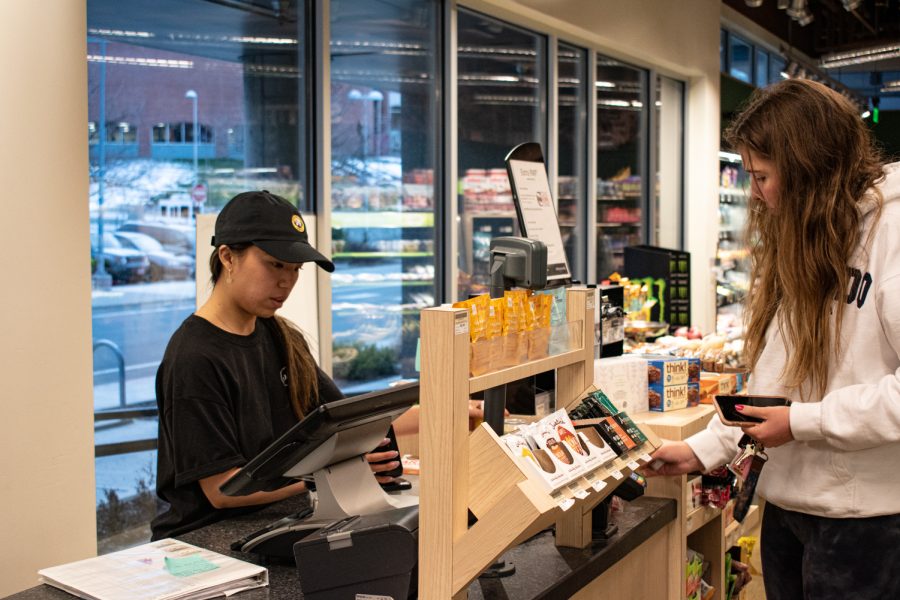Cougar Meal Swipe Program takes RDA donations, feeds Cougs in need
Low funds cause student requests to be denied; Division of Student Affairs encourages students to support peers
While many students spend their remaining Dining Dollars at the markets or dining halls at the end of each semester, they can also donate that money to the Cougar Meal Swipe Program to help feed their fellow Cougs.
April 18, 2022
Editor’s note: Some sources in this article wished to be referred to only by their first name for the sake of privacy.
As the end of the semester approaches, students can once again donate their leftover Resident Dining Account Dollars to the Cougar Meal Swipe Program, ensuring their fellow Cougs are fed.
Established by ASWSU in 2017, the program allocates $10 each day to students in need from a general fund, said Kari Sampson, director of development for the Division of Student Affairs.
“It fully encompasses who we are as Cougs,” she said. “We talk all the time about how WSU is a family away from your family, and we want to lean into that. This is a really unique opportunity for students, even if it is $7 that they have on their balance or it’s $50: that really makes a difference for another Coug. It really comes down to taking care of your own.”
Although donating leftover RDA, Cougar CASH or credit card funds on the program’s website may seem like a small act of kindness, Sampson said the program is very impactful for people who do not know when their next meal might be. Even $35 could provide students with breakfast for a week, she said.
Growing up in a household with a single mother and “not a lot,” Sampson said she understands the importance of accessible food and resources for students.
“Often, the fridge was empty, so I was really fortunate to have neighbors that kind of took me in and would feed me,” she said. “I think taking that model and looking at it at an institutional level; there’s already so many barriers for a lot of students. We don’t want food to be a barrier.”
In order to use the program, students must have less than $10 in Cougar CASH and their dining account combined to request funds on the program’s website once per day. They can use these funds to purchase food from any WSU Dining Services location, according to the website.
Sampson said the funds will be deposited in students’ accounts in less than 48 hours. After five days, any leftover RDA Dollars will be returned to the general fund to maximize their effectiveness, she said.
The program’s fund is depleting quickly and only has $400 left for students this year, Sampson said. At the end of the semester, the Cougar Meal Swipe Program typically receives up to 80 requests for funds per day.
Due to increased requests and limited funds, students’ requests are being denied.
When Andrew* submitted a request five days ago, he was unable to receive funds and was directed to additional student resources, like the Cougar Food Pantry. He said it will be difficult to prepare meals for the next few weeks.
“I think it’s a great program, although I feel like it’s going to be hard for students to depend on, especially if they’re going to run out quickly,” he said.
Ching-Guo Wu, associate director of Administrative Services Information Systems, said the program has received $20,000 in donations through the WSU Foundation and just over $9,000 through the Cougar Meal Swipe Program website this year.
However, only 2,913 out of 10,365 student requests for funds have been successful, he said.
The process of requesting funds allows students to remain anonymous, Wu said. The Dining Dollars will appear as ordinary Cougar CASH or Dining Dollars to the cashier.
“We keep it anonymous and keep it widely available, so people don’t have the guilt of requesting it,” he said. “You just click a button, and you get $10 – no questions asked.”
At the end of the year, Andrew said students tend to waste their RDA Dollars on trips to the markets and dining halls, but donating them is more meaningful to students in need.
Sampson said food has a domino effect on students’ health, focus and sleep when that need is not met. It is a scary statistic that half of the college students in the United States are food insecure, she said.
Although increasing the Cougar Meal Swipe fund is an uphill battle, Student Affairs will “push forward” for the betterment of students, she said.
“It’s one of our core needs. Without food, you’re not able to function in a way you need to be as a student, and it’s something that so many of us take for granted,” Sampson said. “It’s important that we take care of their core needs, so they can be successful at WSU.”






















